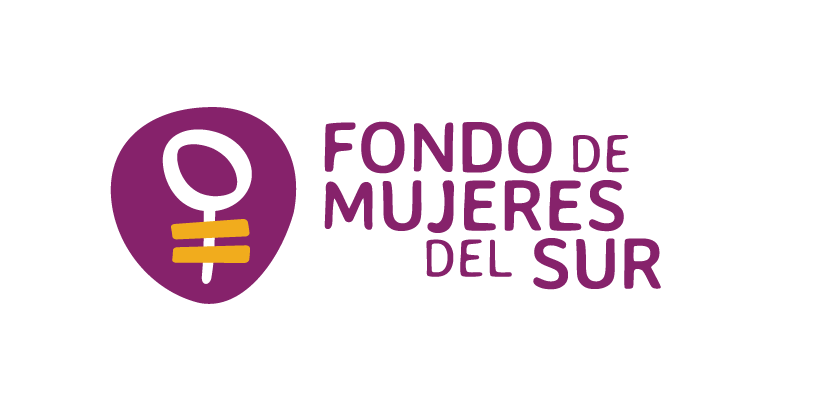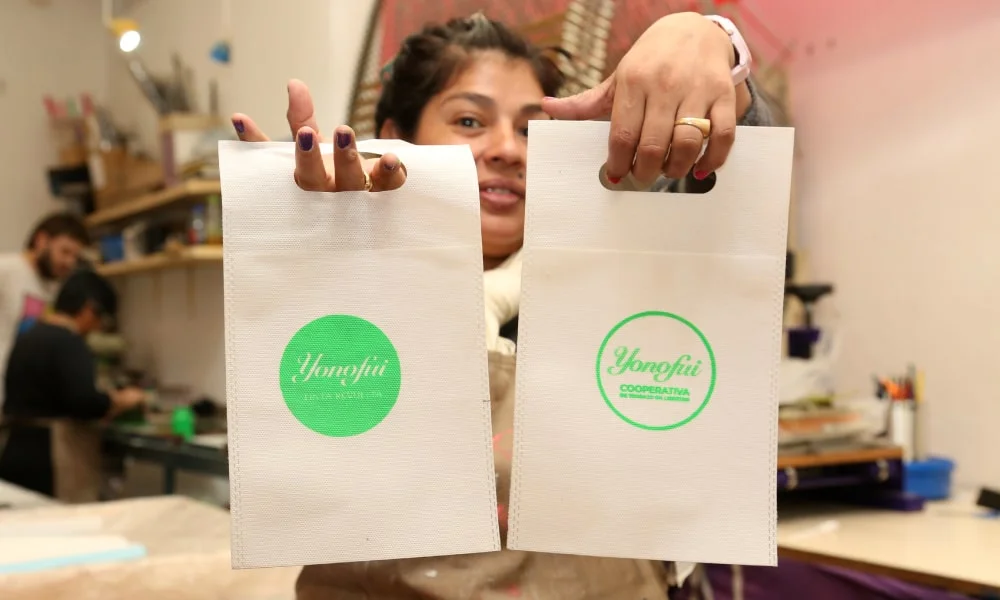From a poetry workshop to a civil association, a cooperative, arts, political and skills training workshops and a series of support and self-reflection projects, such as a mental health area and legal advice area, a publishing house and an audiovisual work collective. This is a very broad summary of YoNoFui, a transfeminist and anti-prison collective that has existed for more than 20 years in the Autonomous City of Buenos Aires (Argentina). In this article, we review their history, projects, while talking about work, artistic languages and their relationship with the justice system.
Report: Eloísa Oliva
Translation: Christina Hamilton
Photos: Clara Muschietti for Fondo de Mujeres del Sur
FIRST: FROM THE BOOK TO THE ORGANISATION
“I worked in a criminal investigation court and that’s how I came to go to prison. I visited for many years and, based on those visits, I wrote a little book of poems called U3, published by Ediciones Del Diego. Because of that book I was called by the Casa de la Poesía in Buenos Aires. At that time (2002), programming was opening up to include unusual places for poetry to be found, such as the Borda and Moyano hospitals or prisons. They called me to give a workshop in Prison Unit 3”. María Medrano is a poet. She is also one of the founders of YoNoFui. She is the one that takes the lead to summarise the story of the organisation that she is still propelling, after 20 years.
That was the start. And once the workshop was well established, there were poetry festivals inside the prison, outings to attend readings and presentations, the publication of three anthologies and, later, or at the same time, the organisation with the women who were released.
“We started having meetings in our houses. The idea was to give continuity to that poetry workshop that had started in prison and, on the other hand, to continue providing support for those who were still detained. The workshop has never stopped all this time, although it mutated from poetry to writing and communication”, continues María. Today the workshops are held in the former U3, now known as the Federal Penitentiary Complex IV (Ezeiza) and in Unit 47 (José León Suárez), both women’s prison units.
When they began to gather on the outside, the problems outside also appeared. “It was great to meet up to write poems and read poetry, but the truth is that the women needed to eat and feed their children. So we said we have to do something that makes money”.
One women had a sewing machine, another knew how to sew, and another knew something else. “Initially, a sewing workshop was set up, it was poetry and sewing,” says María, laughing. “We went out to sell. We went to all the markets in the City of Buenos Aires and surrounding areas. Later friends and acquaintances started to approach us. Some knew how to do bookbinding and could teach, so we all did bookbinding, or we all did textiles” (she laughs again).
Later, a supportive organisation called the Taller Popular de Serigrafía (TPS), offered them their space in what was the Asamblea Popular de Palermo, on Bonpland Street, in the middle of the gentrified neighbourhood of the city. Set between trendy bars, YoNoFui established a place to continue getting together and this space outside the penitentiary started to become more solid, more real. In addition, the people from TPS gave them their first screen printing training, a skill that they still use in the cooperative to this day. “In a very small space we had the screen printing workshop, the bookbinding workshop, the poetry workshop and the sewing workshop”, María recapitulates.
At that time, they did not call themselves feminists, nor criminal abolitionists, nor an anti-prison collective. “We have renamed ourselves over time, and renamed what we did. What today we call seconding someone[1], for example, at first was called social support, which was horrible, then it was assistance”. We now call it to second someone, “because that’s the language used on the street, the one that is understood. You have to second a mate that comes out”, exemplifies María.
Language, what to call themselves, what to call what they do, is something that is ongoing and important to the organisation, which is always questioning itself. Just like, they say, their relationship to prison, to the judicial and penitentiary system in general.
“We never set out to change prison, but rather to transform ourselves with those who were deprived of their liberty. The aim is not to improve the prison to make it a more liveable place, because we’ve always thought that prison is no place to live. For now, we say that we are anti-punitivists, that we are anti-prison”, they recap.
Ari, who is also there for the chat, adds “We say that the fact that there is a hermetic language for justice is another method of colonisation, because we are left out. We say that conflicts were expropriated from us”. María adds, “And therefore, also the ability to resolve them”.
In Argentina, there are 324 detention units (prisons), with Buenos Aires province and the Federal Penitentiary System having the most units (65 and 31 respectively). As of December 31, 2021, there were 101,267 people deprived of liberty in Argentina, which is a rate of 221 per 100,000 inhabitants. Of those people, 96 percent are (cis) male. Of the remaining 4 percent, 3,998 are (cis) women, 151 are trans women, and 23 are trans men. The main crimes for which women are imprisoned are related to the possession and sale of narcotics[2].
We talked about all this one autumn afternoon, with María, Ari and Pipi [3], in the house the organisation inhabits today, in a neighbourhood called Flores. Most of the activities take place here and it is a reference point and meeting space. They run the workshops here, they produce here and maintain the space for reflection, thought, support.
We use a small room on the top floor, while someone downstairs teaches screen printing, others organise the stock of products. We can hear discussions about patterns and, meanwhile, someone who has just been released arrives and looks to be “seconded” by someone at YoNoFui. Everything intersects with everything: inside and outside, reflection and action, production and support.
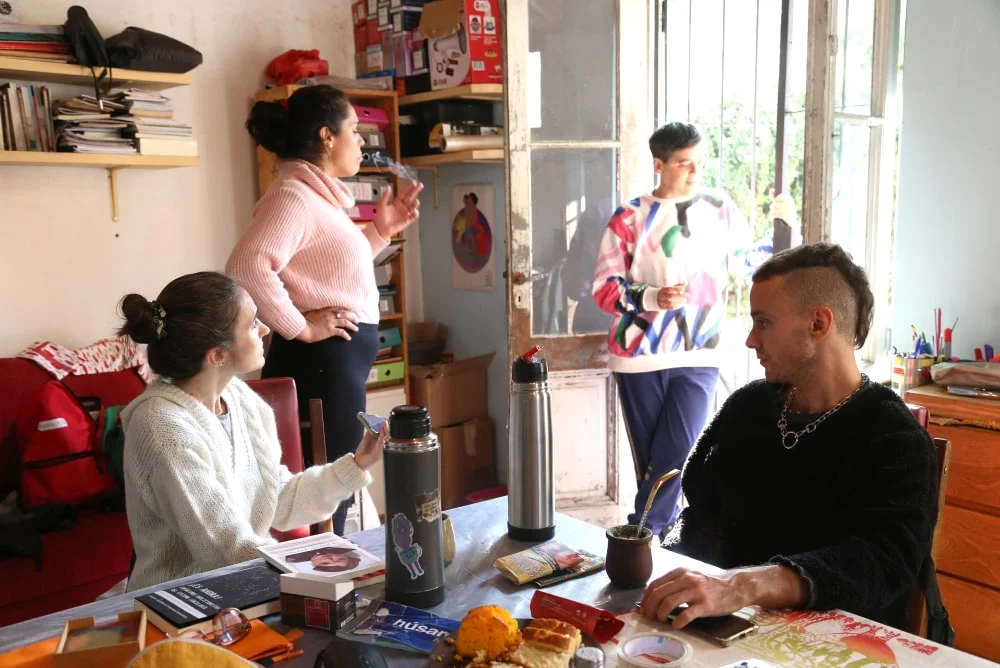
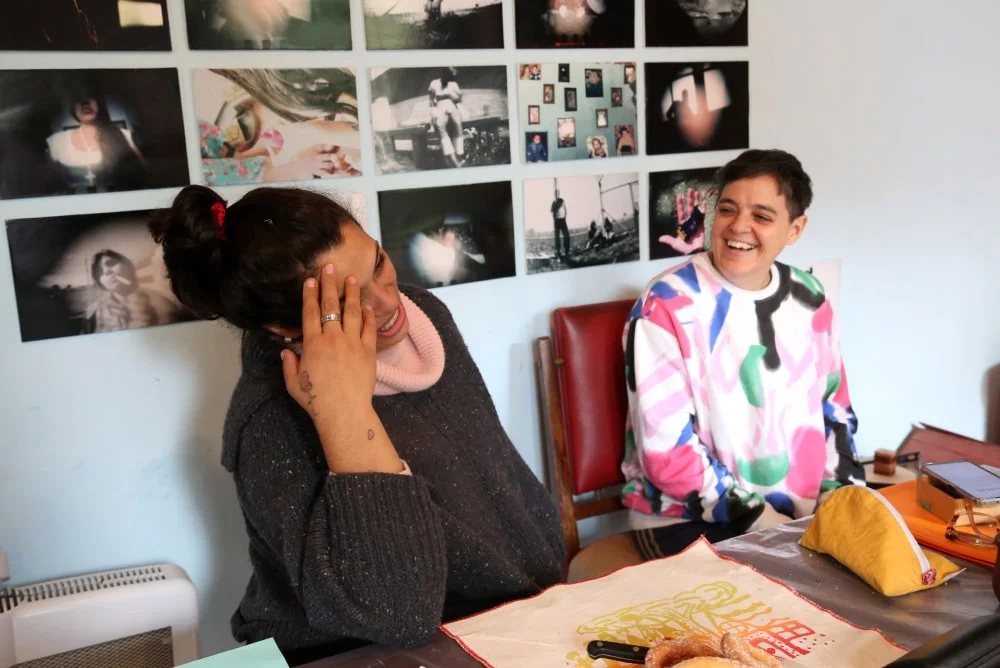
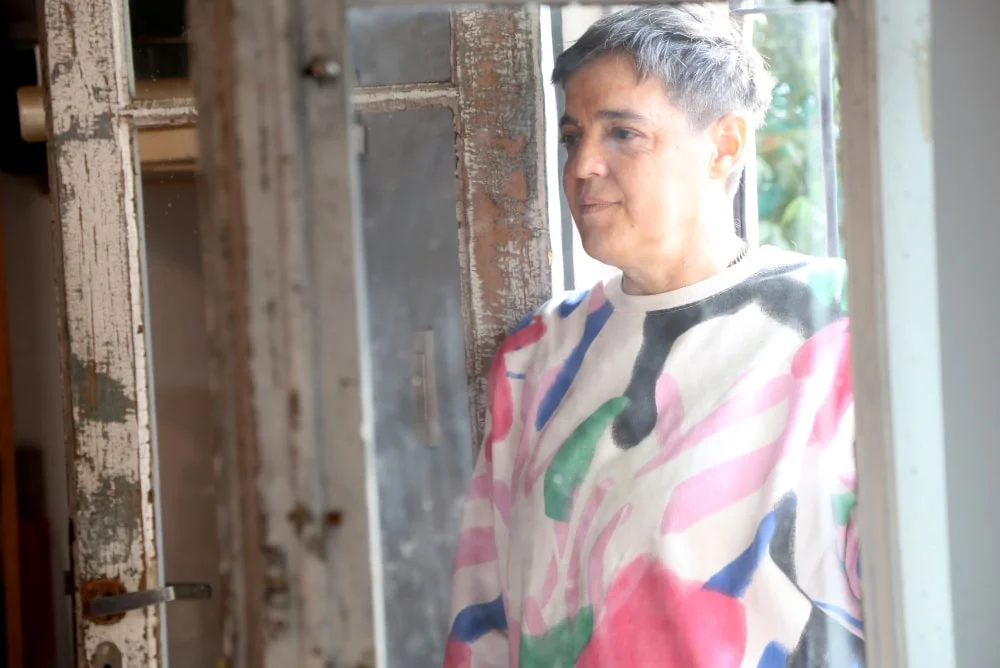
SOME IDEAS ABOUT WORK
Many years ago, when they began to meet out of prison and needed to do something productive, YoNoFui began to operate as a cooperative. It was the way that came naturally to them to deal with an economic venture.
They taught skills, produced and went out to sell. Some time after putting it into practice, they formalised the cooperative, within which today they undertake production projects.
Within this framework, discussions come up while working, day to day. From practice to theory and back again. What to do with self-exploitation, how to dismantle the idea that someone comes and gives you an order (“employer situation”, says Ari), how to decide together about the production plan, resource management, profits. In a nutshell, how to get involved.
Pipi speaks saying that working in a cooperative is quite a process. “Especially for us, who come from the street, from being in gaol, from stealing, from crime so to speak (not delinquents as they call us), getting up early every day is a new habit that you have to get yourself used to. And for many colleagues it is a lot, it is an effort. I sometimes hear them say ‘no, the money is not enough, but I’d rather do this than something else and for something to happen to me, I don’t know who’d look after my kids’. It really means something to them, after going through a collective process”.
María provides a key thought to reflect upon: that cooperative work involves a bond of care. “In a cooperative, everyone is co-responsible,” she says. And Pipi adds that in each space, each workshop at YoNoFui reflects that bond of care. “Seconding someone, listening, the therapy, mental health groups. That helps and is one more ingredient so that the women can go through this process, dismantling, breaking down the habits, the personal, the emotional”, she highlights.
“I think that one of the fundamental things that YoNoFui does is to transform relationships, to be able to establish a relationship with someone else, from a more cared for place, knowing someone is looking out for you and is seconding you”, María adds and Pipi concludes “without prejudice, without judging you, without accusations, without being that measuring
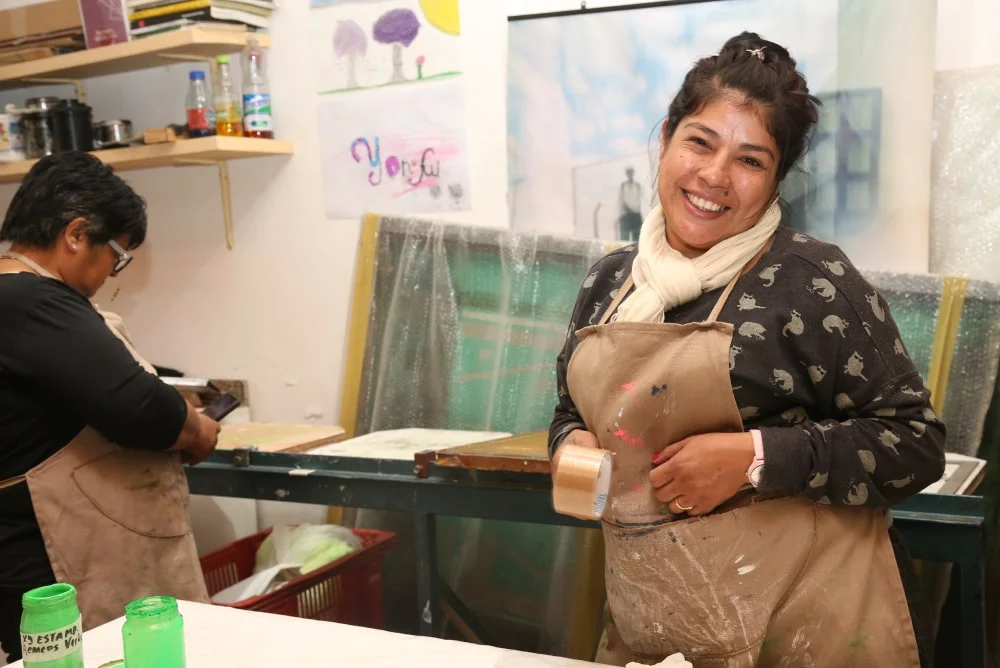
ARTISTIC LANGUAGES AND PUBLISHING
The drive to edit, the situated word, how to name things: that process that goes from the experience to the way of telling it, organising it, transmitting it, and that implies embodying it, is one of the keys that largely mobilises and organises the YoNoFui universe.
The collective has always been driven by artistic languages, that is how it started but also what has been passed on, even in the most production focused parts of the project. A publishing house is also a work space, the same is true for a screen printing workshop or an audiovisual collective.
Writing (as well as reading, or taking a photo, for example) requires a temporal inflection: it implies withdrawing from the flow of everyday life to observe, reflect, perhaps transform. Among the urgencies that YoNoFui deals with, this is still a living, beating heart.
That is why the question about the contribution made by artistic languages comes up naturally. María tries to find the idea, and talks about other ways of inhabiting and thinking about oneself, she talks about how, in many work spaces with languages, especially with words, we can “review our experiences, our life stories, put them up for discussion with others”.
“I think there’s something about being able to do this that’s interesting. For me personally, writing really helps me to rethink myself, or think about myself, in this world, in this life, with the people I share with. There’s a lot going on out there. This also makes me think about the spaces we had for drawing, graphics, painting, photography. There is something about having the chance to converse with our emotions, with our ideas, which is already a lot”, she concludes.
Pipi adds “It is not the same to express an emotion, than it is to write that emotion and go deeper. Thanks to writing, I was able to break down my story and also transform that pain so I can resist. That is what it has given me. And that’s a lot, it’s huge that I’m sitting down and telling you this, resisting myself, my past.
Pipi adds that there are not many spaces like this, “not because I want to suck up to YoNoFui (laughs), but because seriously I only found the writing workshop in gaol. But I don’t see many spaces for writing, thinking, questioning, dismantling, reinventing, and also repairing, in a certain way, healing. How one heals with writing”.
Ari adds that something of particular interest to YoNoFui regarding artistic projects and languages is how they can provoke certain aesthetic disputes, “not only for us, but also for the expansion of the surrounding imaginary.” She gives an example of the ideas that exist around prisons, which are related to the artistic. “People who are not involved with prisons know about them from movies, from Hollywood, from documentaries, from the books they read. Therefore, the imaginary is through aesthetic movements. We pose the question – How are we going to dispute that? Because it matters to us. It seems to me that at YoNoFui there is a constant dispute to follow contemporary discussions, and at the same time put our own forward. When we talk about intervening with the justice system, I think there is also a connection with the aesthetic. In other words, we can intervene using aesthetics, through a book, an exhibition”.
Before finishing the already long talk, we asked about the name, the brilliant name that highlights the creative potential of the organisation. “It came from one of the older women from the poetry workshop,” says María.
First it was used as the name of an anthology of poems. “We were almost ready to print the book and it still didn’t have a title. One day I arrived at the prison and said: I’m not leaving until we have it”, says María.
Ari chimes in: “And ideas such as a break behind bars were suggested”. Maria, laughing, adds “or opening the chains”. And she continues, “They were all really melodramatic ideas and at one point I said ‘that’s enough girls, we wet ourselves laughing here, a lot of things happen that are terrific, the title has to represent a bit of the spirit of the workshop’”.
That was when a group member, Ana Rosell, was game enough to say, “Maybe it could be ‘I didn’t do it’. Everyone that is in here says that”. We all laughed and there was unanimous agreement. “Then we began to think about what was between the lines of that ‘I didn’t do it’, let’s say, what one did not cease to be just because they were in prison,” reflects María.
And when we had to choose a name for the group, we opted for the same one. A name that is not exempt of humour or ambiguities, as they share how “The other day someone said ‘Oh, but am I going to be able to be in the group, because I did do it’”.
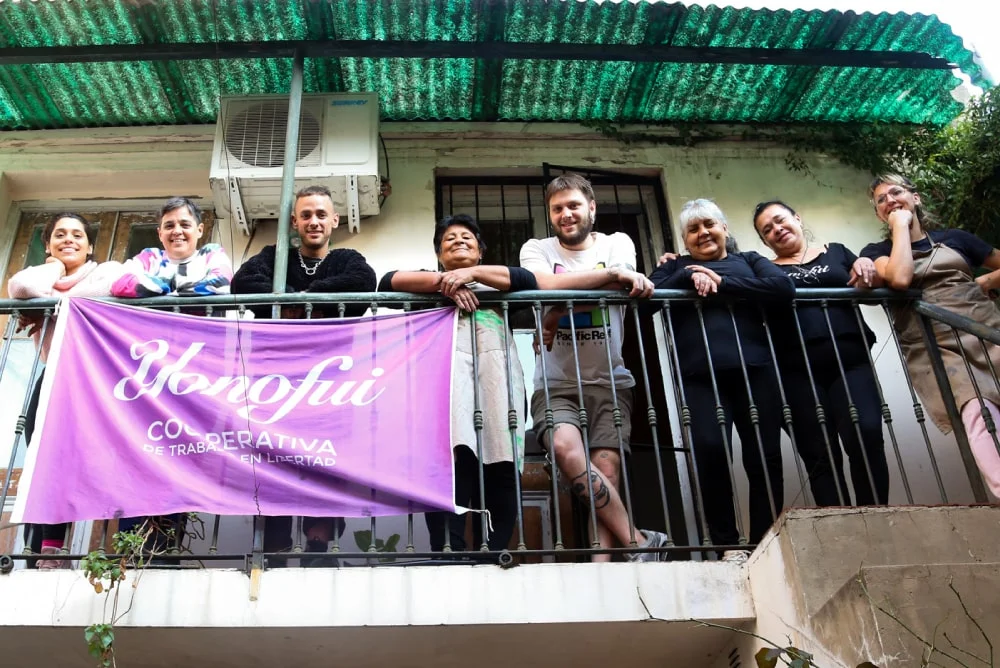
[1] The area that provides support to second others is the integral support area. There are lawyers, psychologists and a social worker who handle the day-to-day procedures, as well as a workshop called “Autonomy and Self-management: Tools for managing daily life” and a therapeutic group “Affectivities and Collective Care” and a “Space to think about upbringings”.
[2] Data extracted from the report called Sistema Nacional de Estadística sobre Ejecución de la Pena (National System of Statistics on the Execution of Sentences) by the Dirección Nacional de Política Criminal en Materia de Justicia y Legislación Penal (National Directorate of Criminal Policy for Justice and Criminal Legislation), of the Subsecretaría de Política Criminal, Secretaría de Justicia, Ministerio de Justicia y Derechos Humanos de la Nación (Subsecretary of Criminal Policy, Secretary of Justice, National Ministry of Justice and Human Rights (2021).
[3] At the time of this interview, Pipi was living at the Casa Cultural Pringles, a shelter for victims of violence and homeless people. A cultural and political centre in the city of Buenos Aires, where women from the YoNoFui Collective live. On Saturday June 17, the Government of the Autonomous City of Buenos Aires carried out a violent eviction, leaving 10 women and 12 children on the street.
